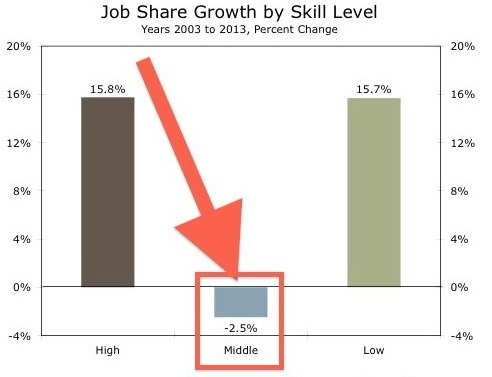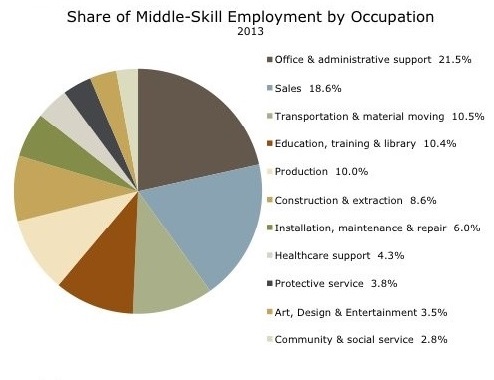One of President Obama’s top economic advisers on Tuesday described long-term unemployment as the most “heart-wrenching” and troubling shortcoming of the economic recovery. He chastised business leaders for not doing more to hire Americans who in some cases have spent years searching for work.
Jeffrey Zients, director of the National Economic Council and the former White House budget director, told a group of Washington business leaders that while the unemployment rate for the short-term unemployed has returned to pre-recessionary levels, the rate for those who have been out of work longer than 27 weeks is twice the normal level.
Related: Strong June Jobs Report Masks Woes of Long-Term Unemployed
“That’s really heart-wrenching,” Zients said at the Economic Club of Washington. “These are very talented people with good relevant experience who can’t get their foot in the door for an interview.”

Zients stressed the administration is “optimistic about where the economy is heading,” especially after 54 consecutive months of private sector job growth after the recession. But he listed a shaky housing market, stagnant wages for the middle class and the highest levels of long-term joblessness since the 1930s as the most challenging domestic problems.
Since the Great Recession officially ended in June 2009, roughly 10 million private sector jobs were added back to the economy, including 2.5 million in the past year, according to a recent report by the John J. Heldrich Center for Workforce Development at Rutgers University. The overall unemployment rate steadily dropped from 8.2 percent in March 2013 to 6.1 percent in August.

Source of charts: US Dept of Labor & Wells Fargo Securities
Three million Americans – or nearly one out of three unemployed workers – has been unemployed for more than six months, says the Labor Department. More than two million Americans have been unemployed for over a year and in some cases much longer than that.
Related: Many Long-Term Unemployed Still Reeling from Recession
Many experts say a relatively weak or uneven recovery has been a major stumbling block for the long-term unemployed. Since 2010, the economy has grown by an annual average of 2.25 percent, well below the historic 3.3 percent pace of U.S. growth since 1929, as noted by MarketWatch.
“The longer people are unemployed, the less attractive they become to companies that often find themselves deluged with resumes these days even when they only have a few job openings,” MarketWatch reported in April, citing a 2012 academic study.
During extended high unemployment, when the number of long-term jobless tends to be especially high, Congress has routinely acted to supplement state unemployment insurance programs, which typically run out after 26 weeks. The federal extension at one point gave some jobless workers as much as 99 weeks of support. However, at the end of last year, Congress let the extension expire, and despite a bipartisan effort to renew it the measure died in the House when Speaker John Boehner (R-OH) refused to consider a bill that passed the Senate or proposals introduced by fellow House Republicans. Boehner said those options were not paid for or did not include measures to help create new jobs.
An analysis by the Democratic staff of the House Ways and Means Committee found that more than 3.6 million Americans who would have been eligible for additional benefits if the program had been extended have been cut off since the start of the year. The report says the provision of extended benefits helped prop up the economy in the years after the recession and prevented millions from falling into poverty.
Related: New Evidence of How Unemployment Wrecks Families
“Evidence proves that federal unemployment benefits played a critical role in preventing the recession from collapsing into a depression and should be part of the nation’s effort toward continued economic recovery,” wrote Rep. Sander Levin (D-MI), the ranking Democrat on the committee.
Zients claimed today that many long-term unemployed are victims of technology: They’ve been unable to keep up with technological advances and changes that put them at a disadvantage in competing with others for job openings. President Obama and administration officials have long urged business leaders to give the long-term unemployed a fair chance to compete for new jobs, but with only modest results. “We not only need targeted government programs, we need corporations to step up to the plate,” Zients said.
Even if big business changes its hiring practices and the economy continues to improve, many workers may still face challenges. A 2013 Urban Institute study of the composition of the long-term unemployed portrayed an underclass of Americans with the deck stacked against them.
“Our main findings are that, relative to currently employed workers, the long-term unemployed tend to be less educated and are more likely to be nonwhite, unmarried, disabled, impoverished, and to have worked previously in the construction industry and construction occupation,” the study concluded.
Rob Garver of The Fiscal Times contributed reporting to this article.
Top Reads from The Fiscal Times:




